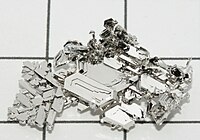
Photo from wikipedia
Germline pathogenic mutations in breast cancer (BC) susceptibility genes (gBRCA1/2) are the most frequent inherited alterations in BC and are involved in the homologous recombination pathway, the principal mechanism of… Click to show full abstract
Germline pathogenic mutations in breast cancer (BC) susceptibility genes (gBRCA1/2) are the most frequent inherited alterations in BC and are involved in the homologous recombination pathway, the principal mechanism of DNA double strand break repair. Platinum salts which act as DNA cross-linking agents are therefore more likely to be active in BRCA-deficient tumors. Women with gBRCA-associated tumors, particularly with triple negative BC, receiving neoadjuvant platinum containing regimens achieved higher pCR rates as compared to wild-type BC. However in two large randomized trials the addition of carboplatin significantly increased pCR rate only in wild-type tumors. On the contrary, the randomized TNT trial showed a significant benefit for carboplatin vs docetaxel in terms of response rate and PFS specifically in patients with advanced gBRCA -associated tumors. Biomarkers of sensitivity to DNA damaging agents beyond gBRCA mutations predicting activity of platinum salts have been proposed and should be validated prospectively.
Journal Title: Critical reviews in oncology/hematology
Year Published: 2019
Link to full text (if available)
Share on Social Media: Sign Up to like & get
recommendations!